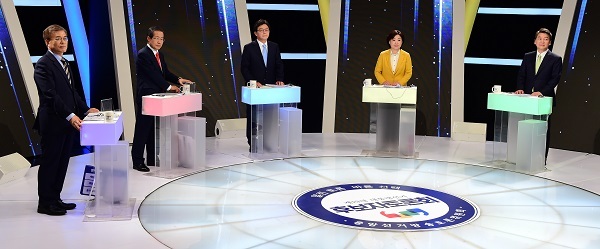[Election 2017] Pressing timeline overshadows policy talks
Candidates swept away by mudslinging, despite ambitious vows for reform and integrity
By Korea HeraldPublished : May 8, 2017 - 15:26
Having witnessed a sitting president ousted over a corruption scandal, the candidates of this year’s snap presidential election each vowed to prioritize integrity and provide the public with detailed policies and a vision for the nation’s future.
But in light of the tight timeline and a highly crowded race, most of them ended up engaging in typical mudslinging campaigns. During televised debates, which acted as a key public communication platform for candidates during the short campaigning period, key state agendas such as economic democratization and political reform failed to attract attention, overshadowed by doubts raised and quarrels.
But in light of the tight timeline and a highly crowded race, most of them ended up engaging in typical mudslinging campaigns. During televised debates, which acted as a key public communication platform for candidates during the short campaigning period, key state agendas such as economic democratization and political reform failed to attract attention, overshadowed by doubts raised and quarrels.

The Constitutional Court’s historical decision on March 10 to impeach former President Park Geun-hye, immediately ousting her from her elected post, set the timer for a turbulent 60 days leading up to the election of a succeeding state chief.
With May 9 chosen for the election, the official electioneering period kicked off April 17, allowing parties and candidates some three weeks to promote themselves to the largely undecided political audience.
Having relatively little time to reach out to the public, major candidates placed focus on the six consecutive televised debates that ran from April 13 to May 2 so as to underline their strengths and reveal rivals’ weaknesses.
“Usually, the television debates do little more than reinforce the already-existing conviction of each voter, but the situation was different this year,” said Shin Yul, a professor of political studies at Myongji University.
“As the race started off in a rush, amid the aftermath of the presidential impeachment, the public didn’t have time to figure out the candidates and consequently turned to the debates to make up their mind.”
But largely due to the pressing schedule, it was mostly superficial features such as the candidates’ attitude, voice and general image that determined their rankings.
For instance, Ahn Cheol-soo of the centrist People’s Party started off the race as a neck-and-neck rival to front-runner Moon Jae-in of the Democratic Party of Korea, but he saw a fall in polls after each debate. The reason was to some extent attributed to his lack of debating skills as well as his attempt to change the sound of his voice, which many saw as abrupt and awkward.
There was also an incident in which Ahn protested against Moon, denying his alleged ties with conservative power groups. This only resulted in a negative impact on his support.
“Am I MB’s avatar?” he said repeatedly during the April 23 debate, holding Moon responsible for spreading rumors that he had close ties with the largely unpopular former conservative President Lee Myung-bak.
Following the episode, Ahn’s support rating moved downward while that of conservative rival Hong Joon-pyo of the Liberty Korea Party saw an uptrend.
Sim Sang-jeung of the progressive minority Justice Party, on the other hand, benefited from the debates, during which her determined way of speaking was seen attracting undecided liberal voters.
The two leading candidates Moon and Ahn have blasted each other on corruption allegations all throughout the campaigning period.
It was the persistent claim of Ahn’s camp that Moon had peddled influence to have his son hired in 2006 and that the case was no different from that involving former President Park’s friend Choi Soon-sil and her equestrian daughter Chung Yoo-ra.
Meanwhile, Moon’s camp claimed that Ahn had exerted influence on universities to get his wife, professor Kim Mi-kyung, hired.
Another allegation was that Ahn had colluded with the former Lee government in overlooking the faulty management of a local conglomerate where he was chairing the board of directors at the time.
Such slandering campaigns differentiated this year’s early election from past presidential races. In 2002, when the late former President Roh Moo-hyun was elected, it was the idea of relocating the nation’s capital to Sejong Admnistrative City which heated up debates. In the 2012 race, the issue of economic democratization and social welfare projects stood at the heart of the policy talks.
Constitutional revision, which was for some time seen as a watershed issue, also fell out of the public’s interest during the three-week electioneering frenzy.
By Bae Hyun-jung (tellme@heraldcorp.com)
-
Articles by Korea Herald








![[Graphic News] More Koreans say they plan long-distance trips this year](http://res.heraldm.com/phpwas/restmb_idxmake.php?idx=644&simg=/content/image/2024/04/17/20240417050828_0.gif&u=)
![[KH Explains] Hyundai's full hybrid edge to pay off amid slow transition to pure EVs](http://res.heraldm.com/phpwas/restmb_idxmake.php?idx=644&simg=/content/image/2024/04/18/20240418050645_0.jpg&u=20240419100350)






![[From the Scene] Monks, Buddhists hail return of remains of Buddhas](http://res.heraldm.com/phpwas/restmb_idxmake.php?idx=652&simg=/content/image/2024/04/19/20240419050617_0.jpg&u=20240419175937)

![[KH Explains] Hyundai's full hybrid edge to pay off amid slow transition to pure EVs](http://res.heraldm.com/phpwas/restmb_idxmake.php?idx=652&simg=/content/image/2024/04/18/20240418050645_0.jpg&u=20240419100350)

![[Today’s K-pop] Illit drops debut single remix](http://res.heraldm.com/phpwas/restmb_idxmake.php?idx=642&simg=/content/image/2024/04/19/20240419050612_0.jpg&u=)